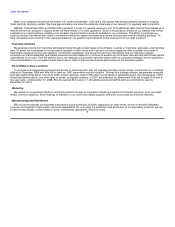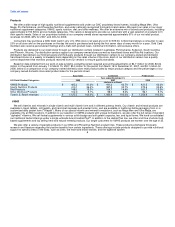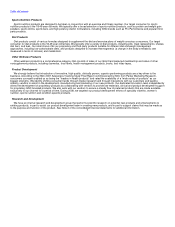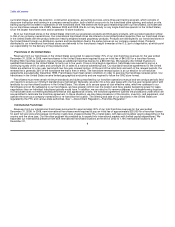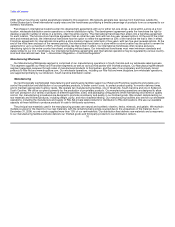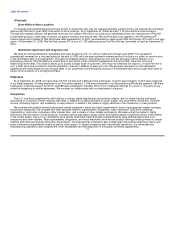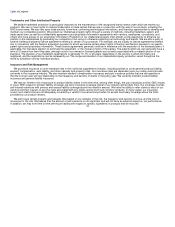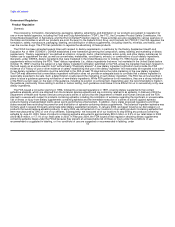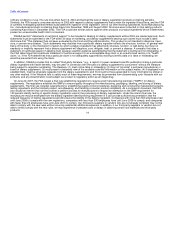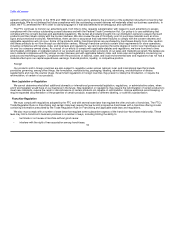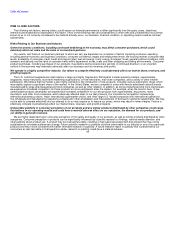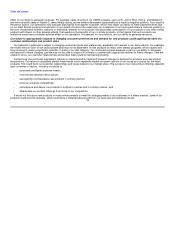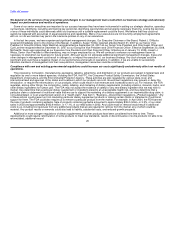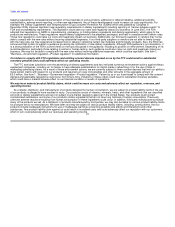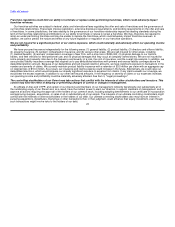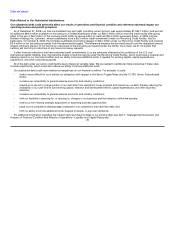GNC 2009 Annual Report Download - page 20
Download and view the complete annual report
Please find page 20 of the 2009 GNC annual report below. You can navigate through the pages in the report by either clicking on the pages listed below, or by using the keyword search tool below to find specific information within the annual report.
Table of Contents
In December 2006, Congress passed the Dietary Supplement and Nonprescription Consumer Protection Act (S3546) ("Act"). The Act, which
became effective in December 2007, mandates reporting of "serious adverse events" associated with dietary supplements and over-the-counter
drugs to FDA by a manufacturer, packer, or distributor whose name appears on the label of the product. Records must be maintained of all
adverse events for six years after receipt. The Act also makes submission of a false report to FDA illegal. We may not be able to comply with
the requirements without incurring substantial additional expenses.
The FDA has broad authority to enforce the provisions of the FDCA applicable to dietary supplements, including powers to issue a public
warning or notice of violation letter to a company, to publicize information about illegal products, detain products intended for import, to request
a recall of illegal products from the market, and to request the Department of Justice to initiate a seizure action, an injunction action, or a
criminal prosecution in the United States courts. The regulation of dietary supplements may increase or become more restrictive in the future.
Legislation may be introduced which, if passed, would impose substantial new regulatory requirements on dietary supplements. Although not
yet reintroduced in this session of Congress, bills have been repeatedly proposed in past sessions of Congress which would subject the dietary
ingredient dehydroepiandrosterone ("DHEA") to the requirements of the Controlled Substances Act, which would prevent our ability to sell
products containing DHEA. In October 2004, legislation was passed subjecting specified substances formerly used in some dietary
supplements, such as androstenedione or "andro," to the requirements of the Controlled Substances Act. Under the 2004 law, these
substances can no longer be sold as dietary supplements. Also, in March 2009, the General Accounting Office ("GAO") issued a report that
made four recommendations to enhance FDA's oversight of dietary supplements. The GAO recommended that the Secretary of the Department
of Health and Human Services direct the Commissioner of FDA to: (1) request authority to require dietary supplement companies to identify
themselves as a dietary supplement company as part of the existing registration requirements and update this information annually, provide a
list of all dietary supplement products they sell and a copy of the labels and update this information annually, and report all adverse events
related to dietary supplements; (2) issue guidance to clarify when an ingredient is considered a new dietary ingredient, the evidence needed to
document the safety of new dietary ingredients, and appropriate methods for establishing ingredient identity; (3) provide guidance to industry to
clarify when products should be marketed as either dietary supplements or conventional foods formulated with added dietary ingredients; and
(4) coordinate with stakeholder groups involved in consumer outreach to identify additional mechanisms for educating consumers about the
safety, efficacy, and labeling of dietary supplements; implement these mechanisms; and assess their effectiveness. These recommendations
could lead to increased regulation by the FDA or future legislation concerning dietary supplements.
The FTC exercises jurisdiction over the advertising of dietary supplements and over-the-counter drugs. In recent years, the FTC has
instituted numerous enforcement actions against dietary supplement companies for failure to have adequate substantiation for claims made in
advertising or for the use of false or misleading advertising claims. We continue to be subject to three consent orders issued by the FTC. In
1984, the FTC instituted an investigation of General Nutrition, Incorporated, one of our then existing subsidiaries, alleging deceptive acts and
practices in connection with the advertising and marketing of certain of its products. General Nutrition, Incorporated accepted a proposed
consent order which was finalized in 1989, under which it agreed to refrain from, among other things, making certain claims with respect to
certain of its products unless the claims are based on and substantiated by reliable and competent scientific evidence, and paid an aggregate
of $0.6 million to the American Diabetes Association, Inc., the American Cancer Society, Inc., and the American Heart Association for the
support of research in the fields of nutrition, obesity, or physical fitness. We also entered into a consent order in 1970 with the FTC, which
generally addressed "iron deficiency anemia" type products. As a result of routine monitoring by the FTC, disputes arose concerning its
compliance with these orders and with regard to advertising for certain hair care products. While General Nutrition, Incorporated believes that,
at all times, it operated in material compliance with the orders, it entered into a settlement in 1994 with the FTC to avoid protracted litigation. As
a part of this settlement, General Nutrition, Incorporated entered into a consent decree and paid, without admitting liability, a civil penalty in the
amount of $2.4 million and 15


